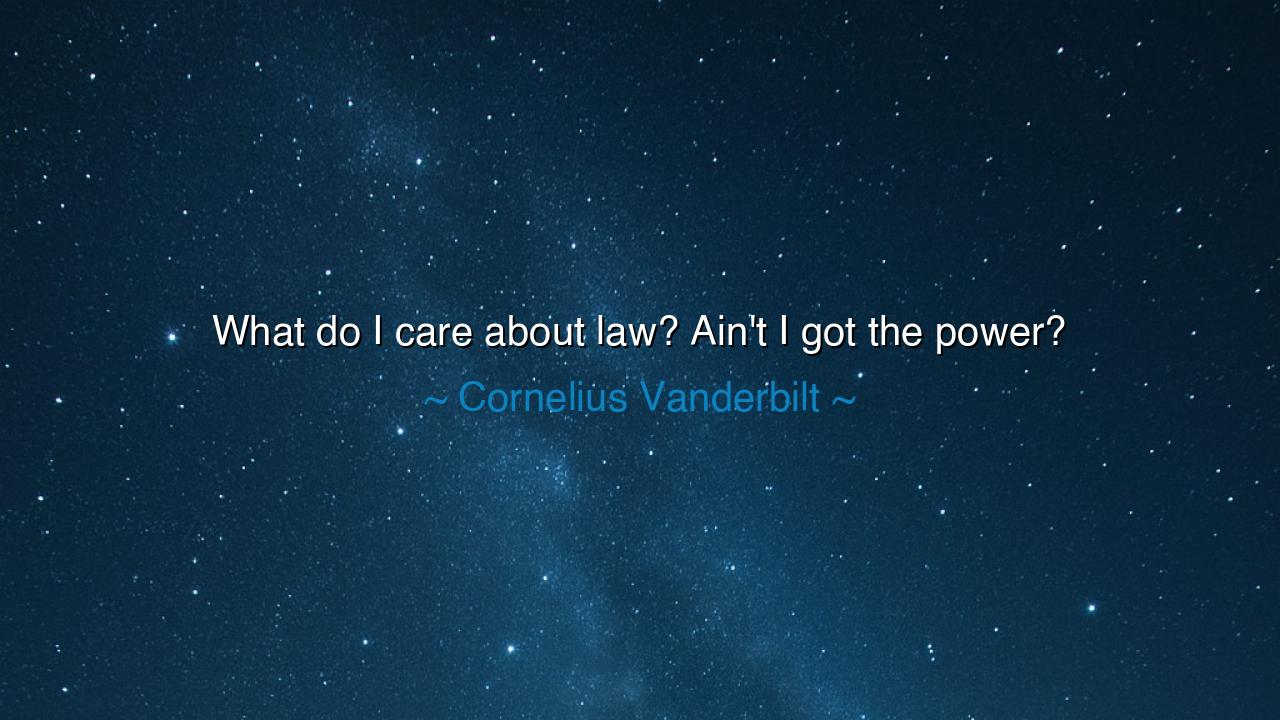
What do I care about law? Ain't I got the power?






Hearken, O children of the ages, to the stark and uncompromising words of Cornelius Vanderbilt, who laid bare the allure and peril of power unchecked. He speaks with the voice of one who believes that authority can transcend law, and that influence alone may bend the world to the will of the strong. Yet within this declaration lies both warning and reflection: the temptation to elevate power above justice has ever been the shadow that haunts mortal ambition.
Vanderbilt’s words reveal the tension between law and dominion. He asks, with blunt honesty, what force can restrain a man who wields might? In his time, as in all eras, wealth and influence provided a semblance of sovereignty, allowing men to shape commerce, politics, and society itself. But the disregard for law, even when cloaked in triumph, carries consequences, for human systems are designed to curb excess and protect the many from the ambitions of the few.
Consider the example of John D. Rockefeller, whose immense fortune in the oil industry allowed him to dominate markets and influence governments. Like Vanderbilt, he wielded enormous power, yet the unchecked exercise of such influence provoked public outrage, investigations, and the eventual establishment of regulatory frameworks. This story illustrates the paradox Vanderbilt embodies: while power can bend immediate circumstances, the arc of justice seeks to balance the scales over time.
Even in smaller realms, this principle holds true. The leader who ignores rules, the merchant who manipulates freely, or the warrior who acts with arrogance may achieve short-term triumphs, yet the law—moral, social, or codified—remains a force that cannot be wholly evaded. History teaches that unchecked power breeds hubris, and hubris, in turn, provokes challenge, resistance, and the eventual reassertion of balance.
O children of the future, carry this teaching in your hearts: recognize that power without conscience or respect for law is fragile and dangerous. Strength may grant command, yet wisdom lies in tempering influence with justice, and in acknowledging that the authority one wields is not absolute, but accountable. Let the words of Vanderbilt echo not as encouragement, but as a warning: even the mighty must heed the moral and legal frameworks that bind the fate of all.
If you desire, I can also craft a visual, ancient scroll-style presentation of this passage to capture the heroic, timeless, and deeply evocative essence of Vanderbilt’s words on power, law, and the tension between might and justice.






QHQue Hop
Cornelius Vanderbilt’s statement feels almost like a cautionary tale about the corrupting influence of power. It’s remarkable that someone could openly disregard the law based solely on their ability to enforce their will. This brings up ethical concerns: Should there be limits to power that ensure laws apply equally to everyone? How do we cultivate a culture where authority does not eclipse legality, and where accountability remains central even for the most powerful individuals?
DNNguyen Dinh Nam
This quote illustrates the age-old conflict between law and power. It makes me question whether legal systems are strong enough to hold the wealthy or influential accountable. Vanderbilt’s attitude seems to suggest that money and authority can override fairness. How does this mindset affect public trust in institutions? Are modern regulations sufficient to prevent powerful figures from operating above the law, or do we still face systemic loopholes that allow such behavior?
RMRosa Meiry
Vanderbilt’s words bring to mind the tension between legality and influence. It’s striking how he prioritizes power over the rule of law, essentially claiming the ability to bend rules to his will. This raises questions about ethics: Can power without accountability ever serve the greater good, or does it inherently corrupt? How do societies balance the concentration of power with protections against abuse, especially when influential individuals may challenge legal constraints?
MLNguyen Minh Lam
Reading this quote, I feel both unsettled and intrigued. It speaks to a mindset where power trumps morality or legal constraints. I wonder how much of Vanderbilt’s era shaped such attitudes, and if contemporary society has truly addressed this imbalance. Does society implicitly reward those who prioritize power over law, or can cultural and legal systems enforce accountability effectively? How do we instill respect for law even among the powerful?
ONOanh Nguyen
This quote makes me reflect on the dangers of unchecked power. Vanderbilt’s statement seems to embody the belief that authority and wealth place one above the law. But is this attitude purely historical, or do we still see it today in corporate or political spheres? How do we ensure that laws are enforced equally regardless of social status or financial influence? What mechanisms can keep powerful individuals from exploiting their position?